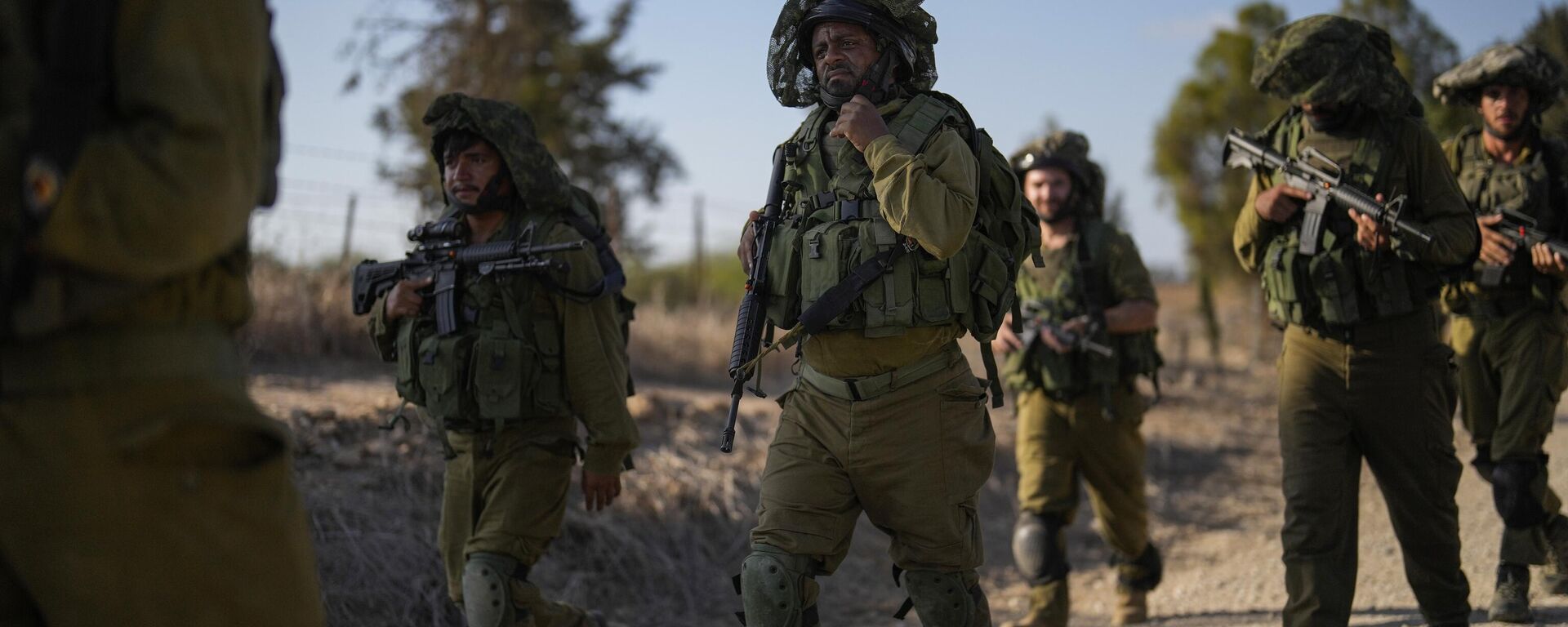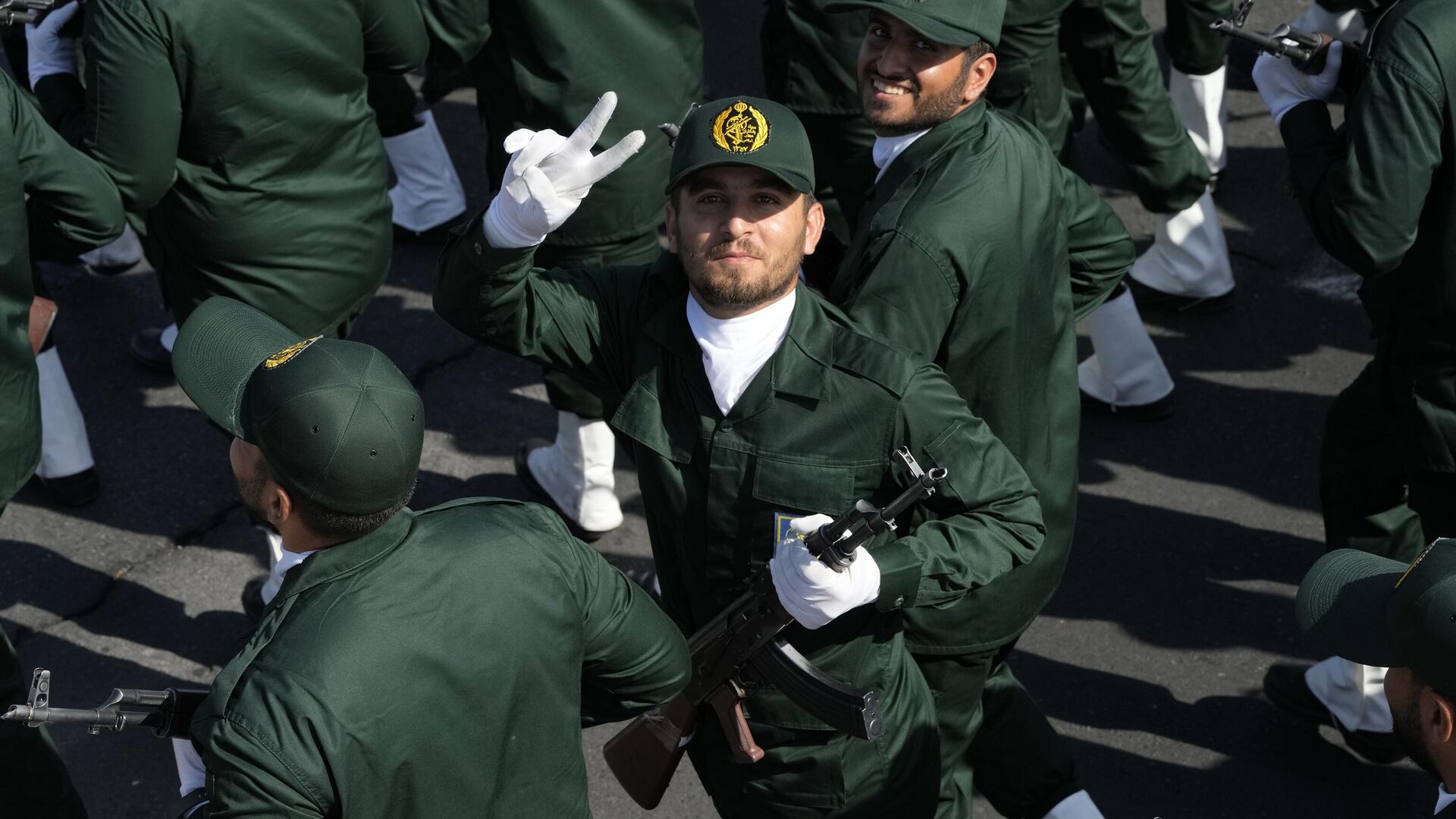https://sputnikglobe.com/20231026/iran-wont-allow-us-israel-to-scapegoat-tehran-over-gaza-crisis--professor-1114504590.html
Iran Won't Allow US, Israel to Scapegoat Tehran Over Gaza Crisis – Professor
Iran Won't Allow US, Israel to Scapegoat Tehran Over Gaza Crisis – Professor
Sputnik International
Iranian Foreign Minister Hossein Amir-Abdollahian arrived in New York City on October 25, as the UN Security Council attempted to reach a compromise on a ceasefire resolution concerning the Israeli-Palestinian conflict. What's behind the move?
2023-10-26T17:00+0000
2023-10-26T17:00+0000
2023-10-26T17:00+0000
world
middle east
hossein amir-abdollahian
iran
israel
the united nations (un)
un security council (unsc)
hamas
palestine-israel conflict
opinion
https://cdn1.img.sputnikglobe.com/img/07e7/09/17/1113607531_0:160:3072:1888_1920x0_80_0_0_7b50b8daff0102b9f506964ebf886f76.jpg
The Israeli-Hamas crisis is continuing to escalate, while global players have yet to find a formula for a way out of the conflict at the UN Security Council.Washington's initial draft resolution failed to address the unfolding humanitarian crisis and did not include a provision for humanitarian pauses. The later US version was also brought down over the "politicization" of the conflict. Moscow's draft resolution called for an immediate "humanitarian ceasefire," while condemning Hamas' surprise attack on Israel as well as "indiscriminate attacks" on Gaza objects and civilians. However, it was vetoed by the United States and the United Kingdom.Iranian Foreign Minister Hossein Amir-Abdollahian arrived in New York, where the UN headquarters are located, on Wednesday, as the regional crisis is threatening to spiral out of control.Izadi noted that the arrival of Iran's diplomacy chief in New York City amid the heated debate at the UNSC is by no means surprising, given that many top diplomats from the Middle East have recently gathered in the Big Apple to discuss the Gaza war.In addition, Tehran needs to represent its interests and articulate its vision at the UN as the US is trying to scapegoat Iran for the conflict, while in fact the blame should be laid at Washington's door, instead, the professor stressed.According to him, the US keeps arming Israel and turns a blind eye to Tel Aviv's disproportionate response, described by Izadi as a "genocide of Palestinians."While the United States has not found any evidence connecting Iran to the Hamas surprise attack on October 7, it is now accusing Tehran of "actively facilitating" rocket and drone attacks on US forces in Iraq and Syria. Tehran resolutely rejected these claims on Monday: Iran "neither gives orders to the resistance groups across the region, nor stop them from taking decisions in their own countries based on their own interests," as Iranian Foreign Minister Amir-Abdollahian told reporters.If the US verbal attacks against Iran translate into military actions, Tehran will respond appropriately, stressed Izadi."Iranian officials have said that if the United States attacks Iran, Iran will attack the United States. That's not very complicated. The message, I think, is clear enough. And Americans realize that Iran's military capability is quite high. That's why they engage in this type of rhetoric against Iran, because they realize that they cannot do to Iran what they are doing to Gaza. It's the language of force that they understand. And Iran has a lot of force available to respond to an American attack," Izadi concluded.
https://sputnikglobe.com/20231019/palestinian-israeli-crisis-has-turned-mideast-into-powder-keg-ready-to-blow-iran-warns-1114336581.html
iran
israel
Sputnik International
feedback@sputniknews.com
+74956456601
MIA „Rossiya Segodnya“
2023
News
en_EN
Sputnik International
feedback@sputniknews.com
+74956456601
MIA „Rossiya Segodnya“
Sputnik International
feedback@sputniknews.com
+74956456601
MIA „Rossiya Segodnya“
israel, israel-hamas conflict, gaza war, the gaza strip, hamas, palestine, palestinian authority, iran, hezbollah, syria, iraq, un security council, un resolution on israeli-hamas war, blockade of gaza, israel ground operation, humanitarian crisis in gaza
israel, israel-hamas conflict, gaza war, the gaza strip, hamas, palestine, palestinian authority, iran, hezbollah, syria, iraq, un security council, un resolution on israeli-hamas war, blockade of gaza, israel ground operation, humanitarian crisis in gaza
Iran Won't Allow US, Israel to Scapegoat Tehran Over Gaza Crisis – Professor
Iranian Foreign Minister Hossein Amir-Abdollahian arrived in New York City on October 25, as the UN Security Council attempted to reach a compromise on a ceasefire resolution concerning the Israeli-Palestinian conflict. What's behind the move?
The
Israeli-Hamas crisis is continuing to escalate, while global players have yet to find a formula for a way out of the conflict at the UN Security Council.
Washington's initial draft resolution failed to address the unfolding humanitarian crisis and did not include a provision for humanitarian pauses. The later US version was also brought down over the "politicization" of the conflict. Moscow's draft resolution called for an immediate "humanitarian ceasefire," while condemning Hamas' surprise attack on Israel as well as "indiscriminate attacks" on Gaza objects and civilians. However, it was vetoed by the United States and the United Kingdom.
Iranian Foreign Minister Hossein Amir-Abdollahian arrived in New York, where the UN headquarters are located, on Wednesday, as the regional crisis is threatening to spiral out of control.
"What Iran has been saying and what many other countries, including Russia, have been saying is they need to have a ceasefire," Foad Izadi, associate professor at the Department of American Studies, Faculty of World Studies, University of Tehran, told Sputnik. "That was the Russian UN resolution that was vetoed by the United States. They like to continue the war. Of course, they don't like the media coverage of the war by independent media outlets. So they want to shut down the media coverage, but they don't want to shut down the war, they want to continue the war. And this is a mistaken calculation that by killing innocent women and children, they can win anything."

19 October 2023, 19:10 GMT
Izadi noted that the arrival of Iran's diplomacy chief in New York City amid the heated debate at the UNSC is by no means surprising, given that many top diplomats from the Middle East have recently gathered in the Big Apple to discuss the Gaza war.
In addition, Tehran needs to represent its interests and articulate its vision at the UN as the US is trying to
scapegoat Iran for the conflict, while in fact the blame should be laid at Washington's door, instead, the professor stressed.
According to him, the US keeps arming Israel and turns a blind eye to Tel Aviv's disproportionate response, described by Izadi as a "genocide of Palestinians."
"Instead of addressing this genocide, they are trying to minimize Israeli crimes and blame Iran for their failures and the Israeli failures," the academic insisted. "They engage in this propaganda demonization of Iran. So having the Iranian foreign minister there is normal because there are other foreign ministers from this region, and [it is] also necessary to address the atrocities that are committed by the United States and Israel," he maintained.
While the United States has not found any evidence connecting Iran to the Hamas
surprise attack on October 7, it is now accusing Tehran of "actively facilitating" rocket and drone attacks on US forces in Iraq and Syria.
Tehran resolutely rejected these claims on Monday: Iran "neither gives orders to the resistance groups across the region, nor stop them from taking decisions in their own countries based on their own interests," as Iranian Foreign Minister Amir-Abdollahian told reporters.
If the US verbal attacks against Iran translate into military actions, Tehran will respond appropriately, stressed Izadi.
"Iranian officials have said that if the United States attacks Iran, Iran will attack the United States. That's not very complicated. The message, I think, is clear enough. And Americans realize that Iran's military capability is quite high. That's why they engage in this type of rhetoric against Iran, because they realize that they cannot do to Iran what they are doing to Gaza. It's the language of force that they understand. And Iran has a lot of force available to respond to an American attack," Izadi concluded.



